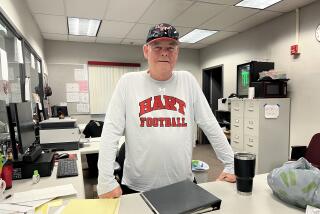Plea Entered From a Wheelchair : Crime: A sobbing 75-year-old man maintains his innocence at hearing on a $70 bank robbery. He says he needed money to buy medicine.
- Share via
SAN DIEGO — A 75-year-old wheelchair-bound heart patient, accused of robbing a downtown San Diego bank of $70 in a desperate bid to get money for medicine, broke down sobbing Wednesday after pleading not guilty during a hearing in U.S. District Court.
But in a new twist to the case, the man’s doctor said the medicine was available under Medi-Cal at two nearby pharmacies, but that the man may not have been aware of that.
“I haven’t done anything wrong,” William Hart said in an interview before the hearing. “Anybody under the same conditions would have done the same thing. . . . I’m not scared.”
Hart, who said he lives on monthly Social Security and disability payments of $718, was released on his own recognizance. He is scheduled to appear Jan. 29 for a preliminary hearing.
If convicted of robbing the bank he could face up to 20 years in prison and a $250,000 fine.
Hart, a retired merchant seaman who says he suffers from a heart ailment, explained that his physician prescribed a costly brand-name medication that he said was not covered by his Medi-Cal insurance.
But Hart’s physician, Dr. John Berger, confirmed Wednesday that the medication--Cardizem SR--was available to Hart at two pharmacies in the area. He was not sure if Hart knew that.
“Some people have difficulty for a variety of reasons of meeting their own needs,” he said. “I know that every effort was done to give him what was needed.”
He declined to discuss the case further, citing confidentiality concerns.
Hart could not be reached for further comment after the interview with Berger.
In the earlier interview, Hart said he “hated to have to go to this extreme,” but insisted that he had tried every other way to find money to buy the medicine.
Authorities have not said whether they believe the man’s version of what happened.
Maria Arroyo-Tabin, chief of the crime division at the U.S. attorney’s office in San Diego, said federal authorities had yet to make a decision on whether to proceed with the prosecution. Officials were seeking additional information before deciding whether to submit the case to a grand jury.
The prosecutor said that, to her knowledge, Hart had only one criminal conviction, a 1980 case in which he pleaded guilty to brandishing a firearm. She could provide no other details on the case.
Hart said that three years ago he suffered a stroke and two heart attacks. He has been on medication since, he said. His right side is partially paralyzed, his attorney said.
“I have no relatives,” said Hart, who said he has lived in San Diego for eight years. “I’m fighting my own battle, and I haven’t given up yet.”
About 11:30 a.m. Tuesday, Hart allegedly went to his bank, HomeFed, where he had only $4 left in his account, he said, and demanded three $20 bills and a $10 bill, warning the teller he had a bottle of explosive nitroglycerin.
“I saw she was real shook up,” he said of the teller. “I’m real sorry about that.”
Moments later, Hart was arrested at a nearby pharmacy, where he had gone to purchase the medicine, allegedly using the stolen money. But this was not one of the two pharmacies where the Medi-Cal payment had been approved.
A security guard from the bank had followed him.
He was released after being interviewed by city detectives and FBI investigators.
Before his court appearance Wednesday, Hart displayed a capful of the yellow and maroon pills. He said he had bought the medication Wednesday, after an elderly woman, whom he had never seen before, handed him an envelope with $100 and a note saying “Blessings from a friend.”
An anonymous donor, who saw news reports of the case, has offered to pay for a year’s supply of medication, said Steve Hubachek, Hart’s attorney.
“He’s in a terrible position,” Hubachek said. “He’s got severe health problems. He’s got no one to turn to. . . . My view is this is not the type of person the government has to be expending their time on.”
More to Read
Sign up for Essential California
The most important California stories and recommendations in your inbox every morning.
You may occasionally receive promotional content from the Los Angeles Times.













